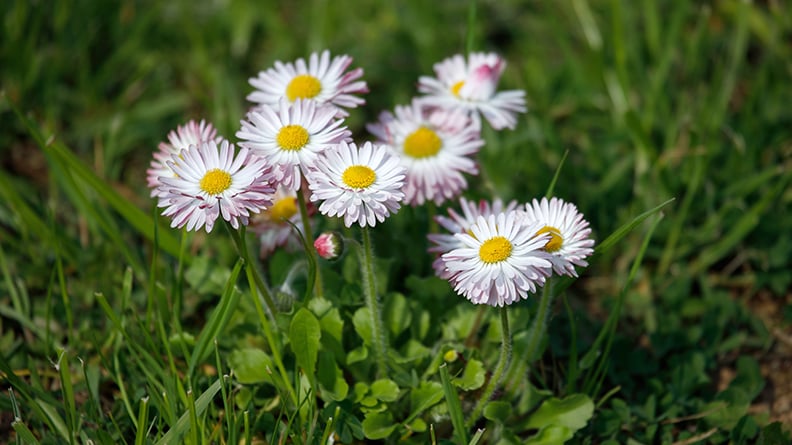Daisy identification and control
Effective strategies for identifying and managing daisies in turf.
On this page:
Daisy Bellis perennis
A common and persistent weed, creeping buttercup often infests turf where the soil is moist, promoting strong growth and deep rooting.
Appearance
The leaves of daisies are typically narrow at the base and oval, often featuring a scalloped edge.
They grow in clusters, forming a rosette shape. Depending on the specific species, the leaf texture can range from smooth to hairy.

Size comparison of a daisy leaf
Daisies flower profusely throughout the season on upright, hairy stems, usually between 50 and 100 mm tall.
Their distinctive flowers generally feature white petals surrounding a yellow centre, though some petals may have a pinkish tint. The blooms follow the sun, opening during daylight and closing at night.
Growth habit
A low growing perennial weed, daisies have a strong root system, comprising a top root and rhizomes.

Bellis perennis in springtime
Conditions that favour its development
It is a widespread weed which can establish itself in most soil but it tends to thrive in low fertile, moist cool conditions.
Cultural control
Focus on maintaining a good sward density to minimise weed seed germination:
- Mow regularly and at a sensible cutting height, appropriate to the grass species and growing conditions.
- Apply fertiliser at appropriate times, as the turf requires, to support healthy growth and good root development.
- Water only if required. Overwatering will weaken the sward and keep the soil moist to encourage the development of the daisy plants.
- Aerate and apply sand top dressing to maintain surface water infiltration and penetration and to encourage the natural breakdown of organic matter at the turf base.
- Brush/rake prior to mowing to when grass growth is strong to remove moss and encourage an upright growth habit.
Small plants can be removed relatively easily using a knife or weed fork, ensuring that all the root system is removed to prevent regrowth.
Chemical control
There are many broadleaf, selective lawn weed killers which will control daisy.
Apply when growth is active, usually between April and October. Repeat if necessary.












